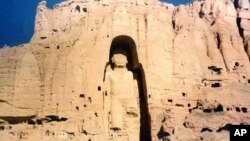Ten years after the Taliban destroyed the giant Buddha statues at Bamiyan, a UNESCO meeting concluded the cultural landscape of Bamiyan must be preserved. UNESCO’s ambassador to Afghanistan says the ultimate decision is up to the Afghan government but that rebuilding the statues will be difficult if not impossible.
The two giant Buddhas, carved into a stone cliff in the Bamiyan valley in the 6th century, were one of Afghanistan’s greatest monuments and the largest example of standing Buddhas in the world until the Taliban destroyed them a decade ago.
Since the fall of the Taliban, historians and archaeologists have debated the possibility and merits of rebuilding the Buddhas.
United Nations Educational, Scientific and Cultural Organization, UNESCO, held a conference this month to discuss their fate. Shigeru Aoyagi, UNESCO’s ambassador to Afghanistan, says it is up to the Afghan government to decide what happens at the site, but that reconstruction may not be an option.
"Well, technically it’s very difficult, the fragments are not left in enough quantity, for example especially the surface of the Buddha is a very big problem," he said.
Aoyagi says reconstruction is not totally ruled out, but specialists are not optimistic.
"There might be some way, if the government decides, if the government wishes for the reconstruction, [but] notably, the bigger one, it’s very, very tough, difficult, almost impossible, that’s the observation of the experts," he said.
In the case of the smaller Buddha, which was about 37-meters-high, Aoyagi says there are more pieces to assemble, but still not enough to rebuild it completely.
"For the eastern part, there might be some measure to reassemble these fragments and then make something symbolize the tragic history of this destruction," he said.
He says UNESCO and Afghan officials have discussed another option.
"The possibility of setting up the Bamiyan Museum, which can preserve these fragments, rich artifacts, as well as tell the people about the [tragic] history of the Bamiyan Buddhas," Aoyagi said.
While UNESCO does not support the rebuilding of the Buddhas, it and the Afghan government do want to ensure the statues, and their cultural importance, are understood and remembered.




